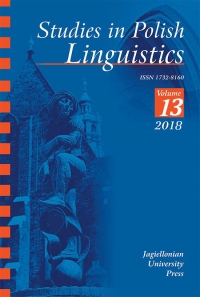Are Dispositional Adjectives a Case of Transposition? – Semantic Effects of -liw(y) Attachment to Verbal Bases in Polish
Are Dispositional Adjectives a Case of Transposition? – Semantic Effects of -liw(y) Attachment to Verbal Bases in Polish
Author(s): Maria Bloch-TrojnarSubject(s): Morphology, Syntax, Western Slavic Languages
Published by: Wydawnictwo Uniwersytetu Jagiellońskiego
Keywords: dispositional adjectives; deverbal adjectives; middle verbs; Subject adjectivizations; LMBM;
Summary/Abstract: The paper presents the constraints on the formation of dispositional adjectives in Polish marked with the suffix -liw(y) and situates the process in a larger-scale picture of the entire class of deverbal adjectivizations. Derivatives with dispositional semantics are argued to be a subclass of Subject adjectivizations/potential adjectives since both are one-participant eventualities, the sole participant being mapped onto the subject position of the main verb. The difference between dispositional and potential semantics is not categorical but a matter of degree. The domain of this process includes intransitive verbs of communication and emission, reflexively marked intransitive verbs referring to emotional states (deponents), (reflexively marked) decausatives, verbs denoting psychological/emotional/mental experiences which syntactically may be transitive but can be viewed as one-participant internal eventualities, non-prototypical transitive verbs which take genitive- and dative-marked objects and verbal roots which alternate between transitive and middle semantics. The dispositional semantics of the adjective depends on the personal/animate or inanimate nature of the participant involved in the eventuality. Thus, it rests with the base (or partly with the nominal argument) and is not supplied by the suffix.
Journal: Studies in Polish Linguistics
- Issue Year: 13/2018
- Issue No: 2
- Page Range: 69-92
- Page Count: 24
- Language: English

